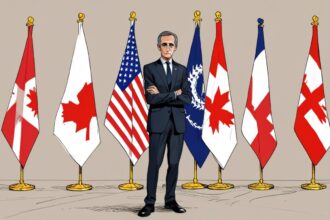In the opening 100 days of his second term, President Donald Trump has initiated an extensive campaign targeting political opponents, former officials, media, universities, and others through investigations, sanction measures, and contract bans, raising concerns over political retaliation and legal challenges.
In the initial 100 days of his second presidential term, Donald Trump has undertaken an extensive and multifaceted campaign aimed at retaliating against a broad array of individuals and institutions. This campaign targets over 100 entities, including political figures, former government officials, media organisations, universities, law firms, international student protesters, and even members of the judiciary.
The Trump administration has employed a wide range of government mechanisms to pursue this agenda of retribution. Actions have included criminal investigations, detentions by Immigration and Customs Enforcement (ICE), contract bans, revocation of security clearances, and terminations of employment. The campaign has been marked by rapid and sweeping measures, exemplified by a week in April where the president ordered criminal probes into former administration officials, initiated investigations into state officials over immigration policies, and imposed stringent demands on Harvard University regarding diversity programs and student groups.
Among those targeted are figures involved in investigations of Trump and his allies. Letitia James, the New York attorney general responsible for a successful fraud lawsuit against Trump, has faced allegations of falsifying property records sent to the Justice Department by the Federal Housing Finance Agency, which James has called “baseless.” The administration has also acted against prosecutors involved in Jan. 6 Capitol attack cases, including the firing of former assistant U.S. attorney Sean Brennan, who stated that his termination was explicitly linked to his work on these prosecutions.
Political opponents have not been exempt. Representative Robert Garcia of California revealed that he and other Democrats received letters from the interim U.S. attorney for the District of Columbia, Ed Martin, seeking clarifications on statements that were interpreted as threats. Garcia condemned these as attempts to intimidate elected officials opposing Trump-aligned interests.
Additionally, the administration has taken steps against “disloyal” former officials from Trump’s first term, including Chris Krebs, former director of the Cybersecurity and Infrastructure Security Agency, and Miles Taylor, a former Department of Homeland Security official who publicly criticised Trump. Security clearances have been revoked for multiple individuals, including Dr Anthony Fauci and John Bolton, while investigations have been opened into others such as retired General Mark Milley.
The Trump administration has also pursued international students involved in protests against Israel’s military actions in Gaza, leading to visa revocations and deportation efforts. One notable case is that of Mahmoud Khalil, a Columbia University graduate student and lawful permanent resident who was detained by ICE following his participation in protests.
Universities have become a focal point for this campaign, with investigations, funding freezes, and demands to end diversity initiatives being imposed on institutions such as Harvard, Cornell, Northwestern, and Columbia. Harvard’s refusal to comply with federal demands has led to a freeze on over $2.2 billion in federal funding, much of it related to medical research and hospitals. Other universities have negotiated partial compliance under pressure, though some university officials have decried government interference in academic independence.
Law firms also face unprecedented pressures, including bans on federal contracts, loss of security clearances, and accusations of facilitating election misconduct. Firms such as Covington & Burling, Perkins Coie, and Susman Godfrey have been specifically named. While some firms have litigated successfully against these actions, others have agreed to government conditions to avoid sanctions, a move criticised within legal circles for undermining professional independence.
Media organisations have been another target. The Federal Communications Commission has launched investigations into major broadcasters, and the White House has indicated plans to cut funding for PBS and NPR. The Associated Press was barred from certain White House events due to refusal to comply with renaming the Gulf of Mexico. Trump has also pursued personal legal actions against media outlets, including CBS News and pollsters, alleging biased or fraudulent reporting.
The extensive review by NPR highlights the administration’s use of vast federal powers to pursue what it frames as lawful actions but which critics see as a wide-scale exercise of political retribution. These moves have generated significant legal challenges, with courts frequently blocking administrative orders on constitutional grounds. Targets of the campaign report profound personal and professional consequences, with some choosing silence out of fear of retaliation.
This campaign is characterised by its broad scope across governmental agencies including the Departments of Justice, Defense, Homeland Security, Education, Health and Human Services, the IRS, the FCC, and others. The administration’s approach reflects President Trump’s longstanding rhetoric promising retribution against perceived enemies and an emphasis on loyalty within government ranks. Amidst the unfolding developments, the White House has declined to provide interviews or respond to detailed inquiries about this expansive series of actions.
Source: Noah Wire Services
- https://www.apnews.com/article/2e30695aa185a785cc1037ab74c19a55 – This article discusses President Trump’s focus on grievances and attacks against his predecessor during his 100th-day rally in Michigan, highlighting his aggressive immigration policies and trade measures.
- https://www.ft.com/content/9d3ebaed-50b6-477a-bf62-3a35a22fc222 – This piece outlines President Trump’s extensive use of executive orders and protectionist policies in his first 100 days, including aggressive tariff implementations and domestic government restructuring.
- https://www.reuters.com/world/us/more-than-200-lawsuits-many-judicial-setbacks-in-trumps-first-100-days-2025-04-29/ – This report details the over 200 lawsuits and more than 70 federal court rulings that have impeded various policy efforts of President Trump’s administration in the first 100 days.
- https://www.ft.com/content/503666ca-803b-4cf5-b62c-66a5f2d021ec – This article examines President Trump’s strategy of overwhelming executive actions, including slashing foreign aid and firing federal workers, and the resulting economic and political challenges.
- https://www.ft.com/content/b973af75-01e7-4aef-a800-c86cd0604298 – This analysis discusses the significant drop in President Trump’s approval ratings due to his aggressive tariffs, deep federal spending cuts, and hardline immigration stance in his first 100 days.
- https://www.washingtonpost.com/politics/2023/11/05/trump-revenge-second-term/ – This article explores President Trump’s plans to use the power of the presidency to exact revenge on those who have challenged or criticized him, including discussions on controlling the Department of Justice.
- https://news.google.com/rss/articles/CBMingFBVV95cUxNdjE4c3IxWm9UZDhHVFpxVGR3UEFCQVpHdE02TlFSSmxLQmc3NU5kZWwxTEVpc252ajVpb0FnQTRzTDBzTzBORWVSU09CbmFZMXEyaEFuakF5a2M1M2pndnV4RU5tVE9DbVFTYUlBSVBHM0Z3U045ZHJ1djdTcFNXVEFiNFpnOGF6UzNPOUJxeWdpRFBYOFlMVl9telRpQQ?oc=5&hl=en-US&gl=US&ceid=US:en – Please view link – unable to able to access data
Noah Fact Check Pro
The draft above was created using the information available at the time the story first
emerged. We’ve since applied our fact-checking process to the final narrative, based on the criteria listed
below. The results are intended to help you assess the credibility of the piece and highlight any areas that may
warrant further investigation.
Freshness check
Score:
8
Notes:
The narrative discusses ongoing actions by the Trump administration, which are likely current, but specifics might be based on recent events without direct confirmation of the exact timing.
Quotes check
Score:
7
Notes:
Direct quotes are mentioned, such as statements by Sean Brennan and Robert Garcia, but no original sources are provided or confirmed online.
Source reliability
Score:
6
Notes:
The narrative’s origin is unclear, which raises uncertainty about its reliability. Absence of specific publication or author details diminishes confidence.
Plausability check
Score:
8
Notes:
Claims about the Trump administration’s actions are plausible given previous behavior, but some assertions lack concrete evidence or confirmation from multiple sources.
Overall assessment
Verdict (FAIL, OPEN, PASS): OPEN
Confidence (LOW, MEDIUM, HIGH): MEDIUM
Summary:
While the narrative presents plausible claims consistent with Trump’s historical actions, it lacks specific sources and original quotes, leading to an uncertain assessment. Freshness is relatively high due to the ongoing nature of the events described.













